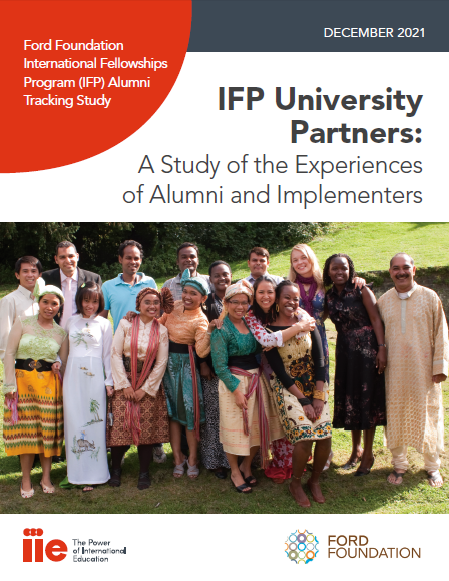BLOG: Lessons learned from Ford Foundation’s International Fellowships Program: the role institutions play in supporting international scholarship students

Selma Talha-Jebril
We are pleased to feature a new study in our 10-year Ford Foundation International Fellowships Program (IFP) Alumni Tracking Study, The IFP University Partners: A Study of the Experiences of Alumni and Implementers. While most of the research to date in the Tracking Study has focused on IFP alumni and their trajectories, this study examines a different set of stakeholders: the higher education institutions that hosted IFP Fellows worldwide. Written by Anne Campbell, PhD, this study is another in a series of pieces engaging with outside researchers on the impact of IFP on its alumni and broader communities.
Between 2001 and 2013, IFP supported graduate or postgraduate-level education for 4,305 emerging social justice leaders from 22 countries. During its implementation, the program developed “strategic university partnerships” with several academic institutions in order to facilitate the incorporation of the IFP Fellows into their campuses. Utilizing the perspective of four of the IFP University Partners, this institutional analysis aimed to understand how the university partners supported IFP Fellows, how IFP may have ultimately influenced the universities themselves, and their procedures or protocols regarding international students.
The study explores the ways in which the University Partners ensured an inclusive and supportive environment for international scholarship students, and in turn, IFP Fellows. One such program or service conducted by the IFP University Partners discovered to be particularly helpful or unique to IFP Fellows included ongoing English and academic writing support beyond pre-academic training programming. Another component highlighted is the significance of the diversity of faculty within academic departments, and their role in supporting international scholarship students.
The University Partners featured in this study are among the institutions that hosted the largest number of IFP students. They include Asian Institute of Technology, Pontifical Catholic University of Sao Paulo, University of Birmingham, and University of Hawaii, Manoa. Four different global regions are represented within this sample, as well as both public and private universities.
Although it only focused on four universities, the study is an invitation to reflect, as well as to engage in conversations about the role of universities in promoting inclusion for scholarship recipients from less privileged backgrounds. In fact, this study is guided by the logic that quality higher education includes efforts to welcome diverse, multicultural, and international students and to provide programming that targets their inclusion on campus. This is social justice work, embedded in the concept of community cultural wealth: individuals with diverse backgrounds enrich communities.